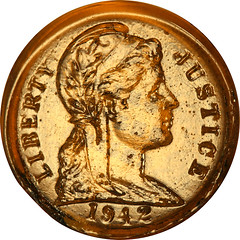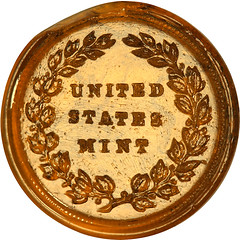
PREV ARTICLE
NEXT ARTICLE
FULL ISSUE
PREV FULL ISSUE
1942 GLASS EXPERIMENTAL DISCOVEREDWe know about the steel cents. How about glass cents? At my request author and researcher Roger Burdette submitted this press
release for an interesting U.S. pattern discovery. Thanks! -Editor
  “Unique” 1942 Glass Experimental Discovered – RB 42-70, Judd 2069 Only known intact glass example of 1942 coinage experiments. A 1942 coinage experimental piece made in glass by the Blue Ridge Glass Company has been discovered by numismatic researcher Roger W. Burdette and certified by PCGS with number 81700131, graded “PR-64.” The glass experimental piece is presently held in a private collection. The piece is made from tempered, yellow-amber transparent glass. It is identical in die alignment to the only other known example, which is broken in half. This is described and illustrated on pages 95-96 of the book Pattern and Experimental Pieces of WW-II by Burdette. Background Several makers of plastic buttons and other small items were loaned a pair of cent-size medal dies prepared by Mint engraver John Sinnock. The obverse included a portrait of Liberty copied from the Columbia two centavos. The reverse design was a simple wreath designed by Anthony Paquet in the mid-nineteenth century with the words “United States Mint” added in the center. The experiments were publicized in trade magazines and officials at Blue Ridge Glass Company in Kingsport, Tennessee, asked to participate. The Mint had a pair of used dies sent from Colt Manufacturing Co., one of the plastics experimenters, and Blue Ridge obtained tempered glass “blanks” (or “preforms”) from Corning Glass Co. Blue Ridge had considerable difficulty in making glass 1942 sample coins. For impressing a design into glass, both glass and the dies had to be very hot – just below glass melting temperature – then the glass had to cool quickly to preserve design detail. But Blue Ridge was not able to heat the die, and the resulting experimental cents were softly detailed and had many minute surface imperfections. Blue Ridge described their process and results in a six page report, which has been preserved among U.S. Mint documents in the National Archives. The present 1942 glass experimental piece is the only intact example discovered in nearly 75 years since the experiments. Although glass was never used for emergency U.S. coinage, this piece represents a unique artifact of the ingenuity and determination of Mint officials and private industry. Description Note: The piece was made using compression molding of hot glass with cold steel dies. Designs are noticeably softer than on plastic or metal examples. Surfaces have irregular glass flow patterns as well as micro cracks and crazing of the surfaces as described by the Blue Ridge report of December 8, 1942. PCGS Coin Information Certificate # 81700131 THE BOOK BAZARREWayne Homren, Editor The Numismatic Bibliomania Society is a non-profit organization promoting numismatic literature. See our web site at coinbooks.org. To submit items for publication in The E-Sylum, write to the Editor at this address: whomren@gmail.com To subscribe go to: https://my.binhost.com/lists/listinfo/esylum All Rights Reserved. NBS Home Page Contact the NBS webmaster 
|